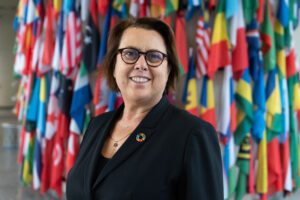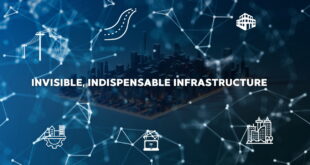
by Viktoria Urban
Space Cafe WebTalk “33 minutes with Simonetta Di Pippo” on the topic of “International Women’s Day 2022 – A Conversation on Women in Space,” took place on 8th March interviewing UNOOSA Director, Simonetta Di Pippo.
Ms Di Pippo maintains responsibility for the Office’s management and administration, provides strategic guidance and ensures that it is implemented in accordance with the mandates of the General Assembly, COPUOS, and the established policies of the UN. She develops the work programme of the Office and ensures its efficiency, transparency and accountability. As the Director, she also manages the peaceful use of the outer space programme.
In her career, Ms Di Pippo has been active in bridging the gender gap in STEM and the space sector thus she was the perfect guest to talk about women in space. Ms Di Pippo was also knighted by the President of the Italian Republic in 2006 and two years later, the International Astronomical Union assigned the name “dipippo” to asteroid 21887, in recognition of her efforts in space exploration. In 2009, she co-founded Women in Aerospace Europe and in 2017, she became a UN International Gender Champion.
Ms Di Pippo thinks that a lot of improvement has been done in the way women are treated in the aerospace sector. This concerns the number of women who contribute to develop important space missions and the number of women in leadership positions as well. However, the figures show that we are far from reaching a balanced representation in the workforce yet.
Women in Aerospace Europe’s aim is to try to help the youngest women experts in the field find their way in the space sector. The social and working environments in different countries do not necessarily have the right mindset to enable this though.
Ms Di Pippo thinks that with the growth of the industry we need more talented people and we cannot afford making a difference between men and women, but the focus has to be on finding the greatest minds regardless of gender.
Like most women, Ms Di Pippo has also suffered either stigma, biased approach or discrimination in her work environment from both male and female colleagues as well. She says that the positive impact of what she does has on others is the biggest reward for her and what keeps her going. She is convinced that this mindset can help everyone put aside events that should not happen.
Changing perceptions is also important according to Ms Di Pippo, as when men make decisions, manage a crisis, they are considered to be the best managers in the world while when women do the same, they might be considered aggressive, deviating from the social perception of having to be open, inclusive and even emotional.
She identifies the main issue starting very early, at the age of 11-12, when girls start distancing themselves from STEM subjects probably due to the social environment. They receive messages that say that STEM is considered to be very difficult, women cannot do it and other recurrent bias. This age is very important in making a decision of what you want to do in the future so children need to be our focus. Girls have to understand that they can do whatever they want to do if they are committed.
Ms Di Pippo is positive and hopeful, as there are already far more women in leadership roles in the space business than in any other sector. She says the only way forward is to avoid any form of discrimination of any kind.
“I’ll be happy when we can close Women in Aerospace Europe because the moment we close it, it means that we achieved our goal: gender equality and balanced representation.”
To listen to the Space Café WebTalk’s insights, you can watch the full program here:
Viktoria Urban, contributing Editor at SpaceWatch.Global: After graduating as a Journalist from Edinburgh Napier University, I am now doing an Astronomy and Planetary Science degree at The Open University (Scotland) which has enhanced my already existing love and enthusiasm for space. I am also a member of and a volunteer for several societies both in Hungary and in the UK and write online content on space for multiple companies as well. I hope my science communication will encourage many to find a job in the space sector, whatever their background and highlight important issues to ensure a sustainable space environment for future generations.





